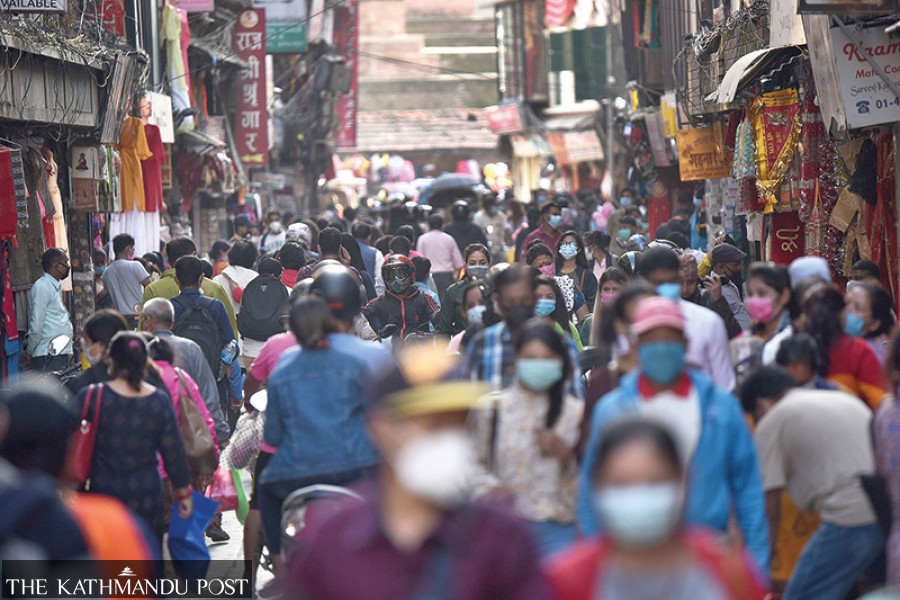Health
Despite declines in new Covid-19 cases, risk of cluster infections remains, experts say
Doctors urge authorities to remain vigilant, increase surveillance and enforce public health measures.
Arjun Poudel
Public health experts have warned that even if the number of new Covid-19 cases is declining of late, cluster outbreaks are still possible in the coming days as public health measures have been compromised.
With the decline in new cases, complacency grows in all sectors. Almost everything has opened up and people are behaving as if the risk of infections has passed.
“A decline in new cases is expected but we cannot rule out the possibility of cluster infections in the coming days,” Dr Biraj Karmacharya, an epidemiologist who is also the head of the Department of Community Medicine at Kathmandu University’s Dhulikhel Hospital, told the Post. “Cluster outbreak of Covid-19 could happen in any sector including at schools, colleges, and offices among others.”
Despite the decline in new cases, studies show that the super infectious Delta variant of SARS-CoV-2 is still circulating in communities.
Several districts of Province 1 still have high infection rates. Of the four swab samples tested at Dhankuta Hospital on Tuesday, two were found positive. On Monday, out of the eight swab samples tested at the hospital, five were positive and in tests of 13 swab samples on Sunday, 10 tested positive.
Of the 165 swab samples tested at the provincial public health laboratory on Tuesday, 116 were found positive. Test positivity rate is over 70 percent.
Mechi Hospital, Jhapa tested 2,259 swab samples on Tuesday and found 100 positive cases of coronavirus.
Of the 1,076 swab samples tested in the last 24 hours in Province 1, a total of 307 were returned positive results, which means the test positivity rate is around 29 percent.
Only 185 polymerase chain reaction tests were performed in Province 2 in the last 24 hours and 16 were found positive.
In Gandaki Province, 283 polymerase chain reaction tests were carried out and it was found that 85 samples had the coronavirus. It is over 30 percent positive of the total tests.
Despite the risks, local authorities in the province are making preparations to reopen in-person classes in schools and colleges.
“We have been preparing to reopen schools and colleges from September 17,” Punya Prasad Sigdel, the chief of the Health Office, Khotang, told the Post over the phone. “We don’t have the resources to carry out polymerase chain reaction tests since the beginning so we have been conducting antigen tests only.”
Meanwhile, experts are worried about the growing complacency in the general public over the contagion.
“The coronavirus has gone nowhere and what has gone is the fear of the virus in the people,” Dr Baburam Marasini, former director at the Epidemiology and Disease Control Division, told the Post. “Despite knowing that the virus could resurge any time, authorities concerned have not taken the risks seriously. There is no room for complacency.”
Authorities in most of the districts, including in the Kathmandu Valley have allowed schools to resume classes in person. Crowds have been increasing in public spaces but no agency has been monitoring whether the public health measures are being followed.
“As the festive season has already started and big festivals of Dashain and Tihar are round the corner, the risk of cluster infections is growing,” said Marasini. “Authorities must increase surveillance even after the lifting of restrictions. The importance of surveillance hasn’t lessened, instead it should be made robust after the lifting of the restrictions.”
The Health Ministry on Tuesday said 1,180 people tested positive in 10,266 polymerase chain reaction tests and an additional 382 people tested positive in 4,177 antigen tests during the past 24 hours. Nineteen Covid-related deaths were reported during the period. Active cases stand at 26,202.
“Authorities should continue the preparations to deal with the possible surge in new cases,” epidemiologist Karmacharya said. “People should also follow public health measures strictly.”
Meanwhile, the Health Ministry said that despite its instructions to increase testing and provide free PCR tests for symptomatic people and those in close contact with the infected, hospitals have been charging test fees and this could be one of the major reasons for the decline in the new cases.
“There are growing complaints about hospitals charging fees for tests,” Dr Samir Kumar Adhikari, joint spokesperson for the Health Ministry, told the Post. “We have been urging hospitals to increase testing but have not received expected cooperation from them.”
Adhikari, warns that the risk of the infection has not declined despite the declines in new cases.
“We are still at very high risk of infections,” said Adhikari.




 11.84°C Kathmandu
11.84°C Kathmandu















